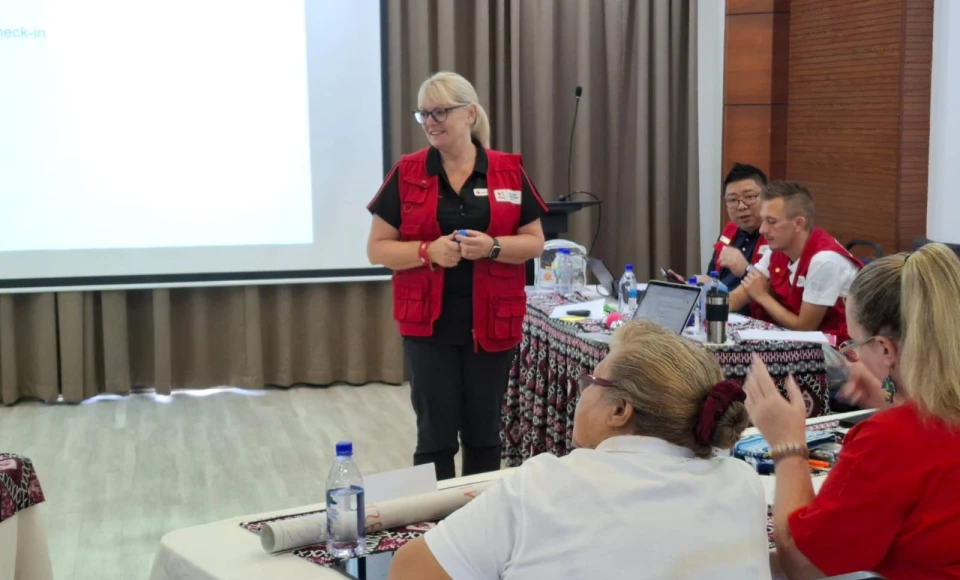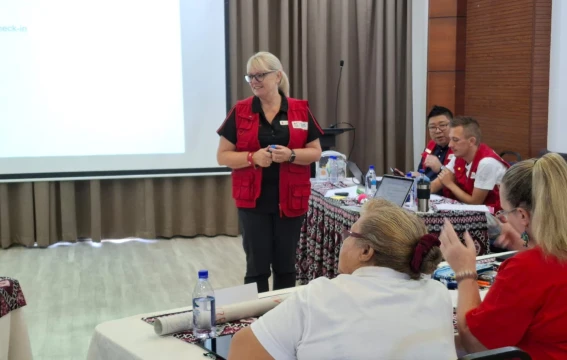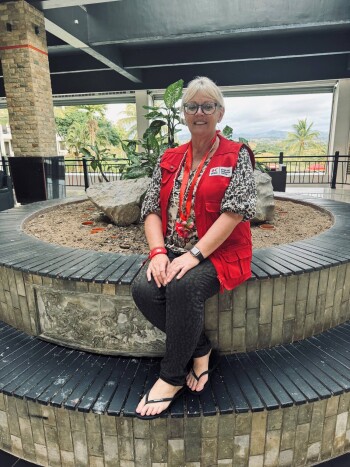‘We came as individuals, we left as a family’ – building first aid capability across the Pacific
14 August 2025


When our International Delegate Lesley Jacobson arrived in Fiji to train first aid instructors from across the Pacific, she knew she was there to teach, but she didn’t expect how much she would learn too.
Lesley, a Master Educator – the first in our region to receive this global title – recently returned from a training hui in Nadi where she worked alongside participants from a range of Pacific National Societies. The goal was to build local capability and strengthen networks of first aid educators throughout the region.
“This was about training the trainers – supporting people in the Pacific to be able to pass on life-saving knowledge within their own communities,” Lesley explains.
“I feel very satisfied that not only have we achieved the objectives of the training and that all the participants were successful, but that it’s also built a community of practice that will continue to support growth in Pacific National Societies.”
Warmth, resilience and connection
The Fiji deployment brought together a wide range of participants, many of whom are already involved in frontline community response across the Pacific.
“The warmth of the Pacific isn’t just about the 33-degree heat – it’s the warmth of the people. The way we came together and supported each other... by the end of the week, we felt like a family,” Lesley says.
One of the most rewarding aspects, she says, was seeing the strong relationships form among the group.
“I’ve been on deployments where I’ve wondered what would happen after we left. But this was different. You could already see the support systems forming – people connecting, problem-solving, committed to helping one another.”
And while Lesley came home tired, she also came home full of gratitude.
“It’s the people that keep me passionate about this work. Their warmth, their resilience, the way they give everything they’ve got to help others. That’s what makes it all worthwhile.”
Learning goes both ways

International Delegate Lesley Jacobson
Despite her title, Lesley says the trip wasn’t just about what she could teach, it was also a chance to learn.
“I probably learnt as much from them as they learned from me. This time, it was a deeper understanding of the reality for many of our Pacific neighbours.”
She was struck by the difference in access to emergency services.
“Here in Aotearoa, we take a lot for granted, like free ambulance services and public Automated External Defibrillators (AEDs). In some Pacific nations, there are no AEDs at all, and ambulances might not be available.”
That made the importance of first aid crystal clear.
“They do what they can with the resources they have available, and their resilience just shines through,” she says.
“It reminds me how vital first aid is in these settings. It can literally make the difference between life and death.”
She also learned how powerful it is to train in culturally diverse settings. Though everyone spoke English, it wasn’t always straightforward.
“There were moments when we realised something hadn’t quite landed – not because of language, but because of context or meaning. I had to slow down and really listen. That was a good reminder.”
The first Pacific-based Master Educator
Lesley is no stranger to the world of first aid education.
In 2023, she became the first Pacific-based Master Educator through the Global First Aid Reference Centre, which is coordinated by the French Red Cross. There are just 27 Master Educators in First Aid around the world.
As part of that journey, she helped review and develop Red Cross first aid curriculum and joined an international network of educators committed to sharing knowledge, tools and support.
“We all worked together across the year and gathered in Paris at the end of 2023 to finalise our work,” she says. “At the end of the week, I received my certificate. It was such a proud moment.”
Making a meaningful contribution
Lesley’s journey with Red Cross began when she was looking to re-enter the workforce after having children. “I didn’t look for a job. I looked for a place where I could make a meaningful contribution aligned with my values.”
Now, years later, that purpose remains just as strong.
“I’m still passionate about the work. It’s the feeling of making a difference, teaching a skill that could potentially save someone’s life or certainly prevent a situation from getting worse,” she says.
“First aid doesn’t change much, but the people do – that keeps feeding my need to go back and do it again. It’s hard work and I come home exhausted, but once I’ve caught my breath, I’m ready for the next opportunity.”
Find out more
- We help communities in the Pacific prepare for disasters, provide support during an emergency event, and help communities get back on their feet afterwards.
Read more about our work in the Pacific - Delegates provide support in several ways including helping to build capacity to strengthen disaster resilience and providing personnel and resourcing during and following a disaster.
Read more about our International Delegate Programme - We deliver a wide range of first aid courses run at venues across Aotearoa, New Zealand.
See information about our first aid courses
